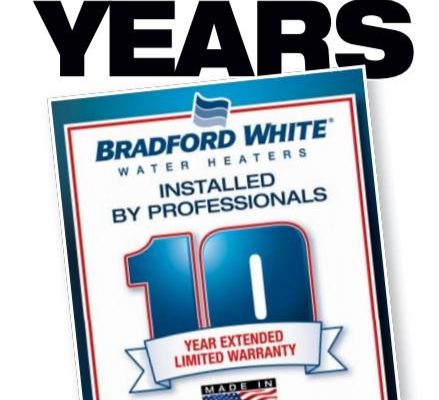
But is it actually worth springing for that extra layer of protection? Imagine your water heater as a quiet housemate: reliable most of the time, but if it ever throws a tantrum (hello, cold water or mysterious leaks), repairs can get expensive fast. Extended warranties offer a sort of “safety net”—but they’re not always what they seem. So if you’re standing in your basement, eyeing your shiny Bradford White, and wondering whether to spend a bit more for an extended warranty, let’s break down all the must-knows in plain English.
What Is an Extended Warranty, Anyway?
Let’s start with the basics. An extended warranty is like buying extra insurance for your Bradford White water heater—except it’s kind of a weird insurance. You’re extending the original warranty, which usually lasts about 6-10 years for most Bradford White models. The “extended” part simply bumps that coverage out, sometimes up to 12 years.
But here’s the thing: it’s not always the same as the manufacturer’s original coverage. Sometimes, an extended warranty kicks in after your original plan ends. Other times, it adds extra services even while your main warranty is still active. It’s important to read the fine print (honestly, bring a magnifying glass), because you don’t want to discover you’re only covered for specific parts or rare scenarios.
In plain English, think of it like this: the extended warranty is a promise from Bradford White—or a third-party provider—that certain things will get fixed or replaced, under certain rules, after your standard warranty runs out. Sometimes it’s a comfort, sometimes it’s pure marketing. Whether it’s worth it depends on the nitty-gritty details.
What Does Bradford White’s Standard Warranty Cover?
Before you even think about extending anything, take a close look at what’s included from day one. Bradford White water heaters typically come with a standard warranty that covers both tank and parts, usually between 6 and 10 years depending on the model and where you bought it. That sounds generous, but there are a few things to keep in mind.
Here’s how it usually plays out:
- The tank itself is covered for leaks or total failure—if your water heater suddenly springs a leak, that’s the big one.
- Key components, like the gas valve or heating elements, are included (within that period).
- Labor is often not covered, or it’s only covered for a short period (sometimes just 1 year).
- Damage from “improper installation,” poor maintenance, or hard water? That’s almost always excluded.
Let me explain: if your water heater quietly does its job for 7 years and then the tank ruptures, you may still be covered. But if something smaller breaks and it’s a pain to replace, or if there’s an issue because the installer took shortcuts, you could be on your own for those costs. Bottom line—a lot of the most expensive disasters are covered, but you’ll want to double-check the official warranty booklet that came with your specific Bradford White model.
How Does an Extended Warranty Change Things?
You might be wondering: “Isn’t an extended warranty just more of the same?” Not always. The specifics with Bradford White can vary a lot depending on where you buy your heater and which company is offering the extended protection.
Here’s what tends to change with an extended warranty:
- The length of coverage. Instead of 6–10 years, you might get 12 or even 15 years on the tank (sometimes on parts, too).
- Coverage on different parts. Some extended plans include more components, like electronics, thermostats, or sediment sensors.
- Labor coverage. A handful of plans help pay for a service technician or plumber, but many don’t.
- Fine print restrictions. Extended warranties often require annual maintenance or water testing (especially for hard water areas). Miss one step, and you can lose coverage.
Think of an extended warranty as a “patch” you add to your coverage, but sometimes, it’s not as broad as the original warranty. It’s also important to check if the extended plan is from Bradford White itself, a local dealer, or a third-party company. The reliability and process for claims can differ wildly.
Common Problems With Water Heaters (and When Warranties Actually Help)
Here’s where things get real. Most water heater issues don’t show up until your unit is a few years old. With a Bradford White, you might not see problems until year 7 or 8, which is often right when the standard warranty is winding down.
The big trouble spots:
- Leaking tank: This is the worst-case scenario—if your tank rusts out or bursts, it’s usually a total replacement job (the most expensive fix). Standard and extended warranties will often cover this, as long as you’ve followed the rules.
- Failed components: Thermostats, gas valves, or heating elements can go bad. Some extended warranties include these, but replacement isn’t as costly as the whole tank.
- Electronic issues: Newer models have electronic controllers. If they glitch, fixes can be tricky—and not all warranties include electronics.
- Routine maintenance issues: Sediment buildup, anode rod corrosion, or problems from not flushing the tank—these are rarely covered by any warranty, extended or not.
So if your main fear is a sudden, catastrophic tank failure, an extended warranty could absolutely pay off. But for the “smaller stuff”—like troubleshooting codes, resetting controls, or swapping out a heating element—the cost-benefit ratio is much less obvious.
How Much Does an Extended Warranty Cost for a Bradford White Heater?
Now, let’s talk dollars and sense. The price for an extended warranty can be all over the place. Some dealers offer it for as little as $100, while others might ask $300–$400 depending on the plan length, what’s covered, and whether labor is included.
If you’re already spending $1,200–$2,000 on a water heater, adding another few hundred bucks for an extended warranty can be a tough pill to swallow—especially if you’re not sure you’ll ever use it.
Budget breakdown:
- For most tank-style heaters, expect to spend around $150–$250 for a decent extended plan.
- If you want labor coverage or a “platinum” level plan, costs can double.
- Third-party warranties may be cheaper, but can be difficult to use when problems pop up.
- Some plans require annual payments, not just a one-time fee.
Honestly, it’s a bit like paying for extra insurance at the car rental place—sometimes you walk away thinking, “Did I really need that?” It always feels like wasted money until you actually have a breakdown.
Alternatives to Extended Warranties: Are They Better?
You might be thinking, “Do I *actually* need an extended warranty, or is there a smarter path?” Good question. There are a few alternatives worth considering if you’re feeling hesitant.
Option 1: DIY Maintenance Fund. Instead of handing money to the warranty company, set aside the same amount in a savings account. If something breaks, the cash is there. If not, you keep the money.
Option 2: Rely on Good Installation and Maintenance. Many water heater failures stem from sloppy installs or skipped maintenance. Hiring a reputable plumber, flushing the tank yearly, and checking the anode rod can dramatically reduce the odds of a major problem—and you’re still covered by the standard warranty up front.
Option 3: Home Warranty Bundles. If your water heater is just one of several aging appliances, a home warranty policy might be more cost-effective. These typically cover a bunch of household systems (including water heaters) for a monthly fee, but claims and coverage can be hit or miss.
The best “alternative” is usually a combination of smart maintenance, good installation, and keeping a small rainy day fund. For most Bradford White owners, this can be just as effective as an extended warranty—sometimes even better.
Who Should (and Shouldn’t) Buy an Extended Warranty?
So, when does an extended warranty make sense? Let’s get specific. If you’re the kind of homeowner who’s risk-averse, hates surprise expenses, or just wants to sleep better at night, the extra cost can be justified—especially for pricier Bradford White models.
People who might benefit:
- Those with hard water (which wears out heaters faster)
- Anyone with limited DIY skills or who hates playing phone tag with repair techs
- Landlords or property managers who want predictable expenses
- Homeowners who plan to stay put for the life of the water heater
People who may want to skip it:
- DIYers who can troubleshoot and repair basic water heater issues themselves
- Anyone planning to move soon (warranties are rarely transferable)
- People comfortable with minor risk or who can afford a sudden replacement
It’s also worth noting—if you’re buying a universal or off-brand water heater, extended warranties might not even be on the table, or coverage could be shaky. With Bradford White, at least you know you’re dealing with a major manufacturer with actual customer service.
Making the Decision: The Bottom Line
Here’s the honest truth: The question of whether an extended warranty is worth it for a Bradford White water heater doesn’t have a one-size-fits-all answer. It really comes down to your personal comfort with risk, your home’s water quality, and how much hassle you’re willing to tolerate if repairs are needed down the line.
If you’re someone who loses sleep over potential appliance meltdowns—or if replacing a water heater would be a huge financial burden—an extended warranty can buy valuable peace of mind. On the other hand, many folks buy that extra coverage and never use it. Sometimes, the smartest move is to keep up with routine maintenance and put the “warranty money” in your own rainy day fund.
Whatever path you pick, knowing how extended warranties work—and what they *don’t* cover—puts the control firmly in your hands. Bradford White water heaters are built to last, so in many cases, sticking with the standard warranty and a bit of careful upkeep will see you safely through all those hot showers for years to come.
